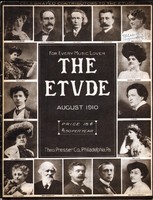Those music lovers who pray with Charles Dickens, "Lord, keep my memory green," will hardly need to be reminded that 1910, besides being the centenary of Chopin and Schumann, is also the bicentenary of Dr. Thomas Arne, the composer of Rule Brittania. This famous English composer was the son of a well- known upholsterer, Thomas Arne, of King Street, Covent Garden—the upholsterer mentioned by Addison in The Spectator of April 27, 1711—and was educated at Eton College. He was originally intended for the law, and, like Sir Joshua Porter in Pinafore, he "served a term in an attorney's firm," though we have no direct evidence to show that he "polished up the knocker on the big front door." He seems to have found this little to his taste, however, for we are told that he privately conveyed a spinet to his bedroom, where he indulged in clandestine practice during the nighttime, muffling the strings with a handkerchief in order toavoid being detected by his father, who disapproved of music. He was also in the habit of disguising himself by wearing livery and attending opera in the "servants' gallery." Subsequently he was discovered playing the violin by his father, and after some fruitless efforts to prevent him the young musician was permitted to go his own way unmolested.
He soon made his way as a composer of opera and oratorio—in which latter he was the first composer to introduce female choruses—and rapidly became established as a leading musician, despite the fact that his star was dimmed by a greater—that of George Frederick Handel. He was instrumental in bringing forward his sister, Susanna Maria, who eventually became Mrs. Cibber, the well- known tragic actress. Dr. Arne's chief claim upon the present generation, apart from his florid announcement that "Britons never, never, never shall be slaves," is as the composer of those delightful settings of the Shakespearian lyrics, Where the Bee Sucks, Under the Greenwood Tree, Blow, Blow, Thou Winter Winds, etc., songs of such sweetness and so nicely attuned to the spirit of the words as to render them immortal, his songs The Lass with the Delicate Air and Polly Willis. Thomas Arne was not knighted as he probably would have been nowadays, as many musicians in those days narrowly escaped being classed with actors as "rogues and vagabonds," but he was made a Doctor of Music by Oxford University and was honored very highly by his own countrymen, whose appreciation took the practical shape of golden guineas. He died March 5, 1795, and was buried at St. Paul's, Covent Garden.



